'This Isn't Frugal. This Is Stupid': EU's $2.1Tn Deal Falls Short On Demand For Just, Green Recovery
"They have cut funding for health, research, and climate, and failed to guarantee that public money won't go to polluting industries."
by Jessica Corbett
Climate campaigners on Tuesday chastised European Union governments for failing to deliver a just, green recovery in a $2.1 trillion stimulus fund and long-term spending plan celebrated by regional leaders as a "historic" deal after an "acrimonious" summit that dragged on for nearly five days.
Greenpeace E.U. climate policy adviser Sebastian Mang expressed disappointment with the agreement and urged the European Parliament to make improvements to the plan that align with what green groups have demanded for the past several months throughout the public health crisis and resulting economic recession.
"European governments said they would deliver a green recovery plan from the Covid-19 pandemic, but they have cut funding for health, research, and climate, and failed to guarantee that public money won't go to polluting industries," Mang said in a statement Tuesday.
"This means any good investment could be cancelled out by support for outdated industries," he added. "After locking heads at one of the longest summits in E.U. history, our governments have come up short. The European Parliament now has to weigh in to improve the prospects of a green and fair recovery."
Henrik Enderlein, director of the Jacques Delors Center at the Hertie School in Berlin, similarly criticized the cuts to health, research, and climate transition. As he put it in a tweet Monday, with an apparent reference to the so-called frugal states: "This is not frugal. This is stupid."
Leaders from the European Union's 27 members states agreed to establish a €750 billion ($857.33 billion) Covid-19 recovery fund and settled on a 2021-2027 budget. The deal, Reuters noted, "now faces a potentially difficult passage through the European Parliament and it must be ratified by all E.U. states."
Euractiv reported that "while the size of the overall fund was preserved at €750 billion, the ratio between grants and loans was rebalanced with major consequences for key E.U. programs, some of which form the bedrock of the current European Commission's priorities." As the outlet explained:
One of the biggest losers is the Just Transition Fund, which was downgraded from the commission's €40 billion climate action war-chest to just €10 billion, illustrating how low down the pecking order environmental policies ultimately fell during the talks.
The final deal maintained the stipulation that only countries that have signed up to the E.U.-wide goal of climate neutrality by 2050 will be eligible for full funding.
In a series of tweets Tuesday, Greenpeace E.U. acknowledged that the agreement calls for 30% of all spending to go toward tackling the climate crisis, guided by the European Green Deal, but raised concerns that public money could continue to go to polluters and denounced the continent's 2030 and 2050 climate targets as inadequate:
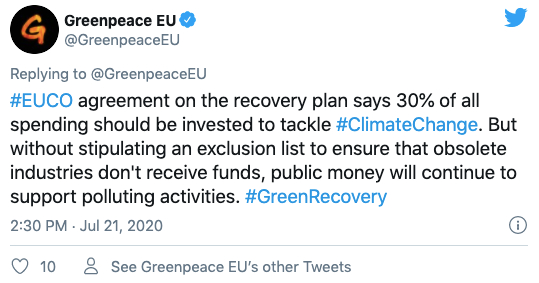
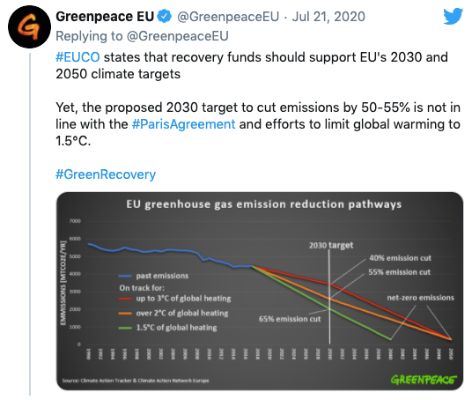
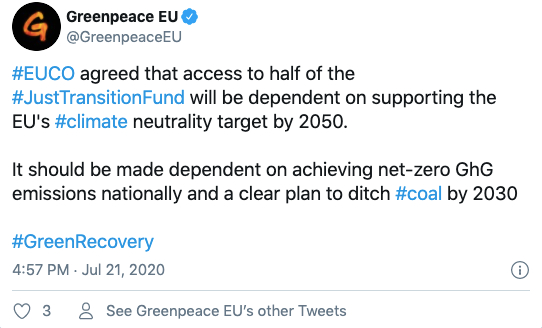
Swedish climate leader Greta Thunberg, founder of the Fridays for Future movement, also responded on Twitter to the deal, declaring that "we can have as many meetings as we want—as long as the climate crisis isn't treated as a crisis the action needed will remain out of sight."
Thunberg highlighted an open letter that she and three other school climate strikers—Luisa Neubauer of Germany and Anuna de Wever van der Heyden and Adélaïde Charlier, both of Belgium—sent to to global and E.U. leaders last week encouraging them to #FaceTheClimateEmergency.
"We need to end the ongoing wrecking, exploitation, and destruction of our life supporting systems and move towards a fully decarbonized economy that centers around the well-being of all people as well as the natural world," says the letter, now backed by over 78,000 people and 320 scientists from 50 countries.
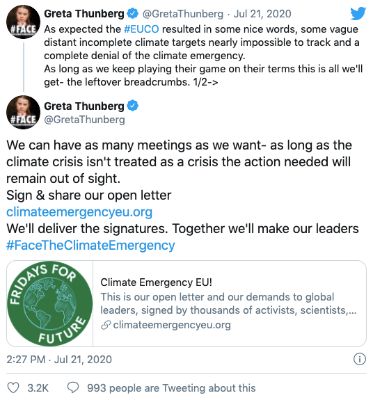
Markus Trilling, finance and subsidies policy coordinator at Climate Action Network (CAN) Europe, was more welcoming of the Multiannual Financial Framework (MFF) 2021-2027 and funding for the continent's coronavirus recovery plan, which is called "Next Generation E.U." However, in a statement Tuesday, he still urged the continents leaders to go further.
"This ambitious decision to link the recovery funds with E.U.'s climate commitments must now trickle down to the member states' spending plans," Trilling said. "What leaders will put in their plans will define the E.U.'s response to both the climate and economic crises in the next 10 years. Now, E.U. leaders must use the full potential of E.U. funds to boost climate action and exclude support to fossil fuels."
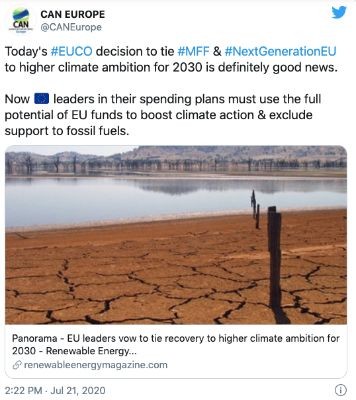
Though some climate activists were frustrated with the E.U. leaders' agreement, the Associated Press reported Tuesday that "the days and nights of brutal summiteering" since Friday "ultimately produced a typical Brussels deal," citing Adriaan Schout, a senior research fellow at the Clingendael think tank in the Netherlands.
"The E.U. hasn't changed. This is always what it's about—finding compromises—and the E.U. always finds compromises," Schout told the AP. "And the compromise has been hard fought. There are checks and balances in it. We don't know how they will work."
Jessica Corbett is a staff writer at Common Dreams.


 Palestine Forum of New Zealand: A Message To Pope Leo XIV
Palestine Forum of New Zealand: A Message To Pope Leo XIV Pacific Islands FFA: Ten Years Together - Celebrating Regional Solidarity Through The NTSA
Pacific Islands FFA: Ten Years Together - Celebrating Regional Solidarity Through The NTSA ITUC: The Greatest Threat To Democracy In 80 Years - Stop The Billionaire Coup
ITUC: The Greatest Threat To Democracy In 80 Years - Stop The Billionaire Coup Save The Children: A Third Of 5-Year-Olds Will Be Spared Unprecedented Lifetime Exposure To Dangerous Heat If World Meets 1.5°C Temperature
Save The Children: A Third Of 5-Year-Olds Will Be Spared Unprecedented Lifetime Exposure To Dangerous Heat If World Meets 1.5°C Temperature Access Now: NSO To Pay $168 Million In Damages To WhatsApp For Pegasus Spyware Hacking
Access Now: NSO To Pay $168 Million In Damages To WhatsApp For Pegasus Spyware Hacking NIWA: New Study Reveals Climate Change Is Already Impacting The Andes
NIWA: New Study Reveals Climate Change Is Already Impacting The Andes